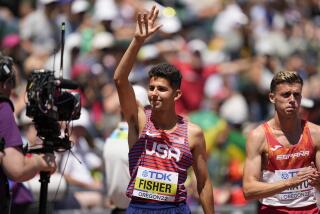Rower Takes Full Advantage of High-Tech Advances : Olympics: Newport Beach’s Chip McKibben credits new training techniques for his rapid improvement in the sport.
- Share via
Rowing seems simple enough, at least to those watching from the shore.
Pick up some oars, put ‘em in the water, pull, and watch the boat go.
Chip McKibben knows better.
McKibben, a resident of Balboa Island, can talk at length about efficient oxygen transportation, slow-twitch and quick-twitch muscles and the benefits of expanded capillary capacity.
To some, applying those high-tech terms to rowing might seem like making a simple cruise around Newport Bay sound like a circumnavigation of the globe.
But to McKibben and his teammates on the Barcelona-bound U.S. Olympic rowing team, understanding and applying advanced training principles are the keys to the sport.
“It’s the same as in any other athletic competition,” McKibben said in a phone interview from Silvaplana, Switzerland, where the U.S. team is training. “You have to constantly improve how you train and condition yourself, or you’re not going to be competitive, and you have to know why you’re training in a certain way to get the most out of it.”
McKibben, 27, is especially interested in the scientific aspects of rowing training. A former basketball and volleyball player at Corona del Mar High, McKibben began rowing competitively at Orange Coast College.
There, he volunteered to be part of a special physical training program sponsored by the junior national rowing team.
“Everything was specifically tailored to rowing,” McKibben said. “All of my previous training had been the usual kind, working the chest and the arms and all the beach muscles, but rowing is all legs and back.
“I started learning about the differences between aerobic and anaerobic activity, and all these subtle training things they had us do caught my attention, and I’ve stayed interested in it.”
McKibben, who had paddled outrigger canoes for several years before joining Orange Coast’s crew, progressed quickly as a rower after beginning the conditioning program. His success in single sculls at OCC led to further success at Cal, where he was a member of the 1986 Pacific 10 Conference eight-man championship team and a first-team all-conference rower for two years.
At 6 feet 6 and 220 pounds, McKibben’s build is well-suited for rowing, and he credits his rapid improvement to a natural tendency to excel in aerobic sports.
“When I started rowing, I found out I was very efficient in a five-minute, all-out aerobic activity,” McKibben said. “I wasn’t naturally well-suited for basketball and volleyball, because those are sports with a lot of stops and starts. Rowing is a tedious sport at times, but I like it because you go full blast for five minutes and you’re done.”
At the U.S. time trials in May, McKibben was the top qualifier in singles and in doubles with partner Kier Pearson. In Barcelona, however, McKibben will concentrate on the quadruple scull team, which consists of McKibben, Pearson, Bob Kaehler and John Riley.
McKibben considered competing in the singles and doubles as well but considers being a member of the quad team as a top gold medal opportunity.
“It really is a great chance for us,” McKibben said. “Besides, at the Olympic level of competition, there isn’t going to be enough recovery time between all the heats for someone to be able to give their best in more than one event.”
McKibben, who handles the stroke (stern) seat of the quad scull, also pointed out that the U.S. team’s depth should ensure a top U.S. rower in every event.
As a member of the U.S. National team since 1987, McKibben had medaled in numerous national and international competitions, including third in single sculls at the 1991 U.S. National Championships and second at the 1990 Piediluco International Regatta in the four-man sweep (single oar). Still, McKibben believes his best years as a rower might be ahead of him.
“Our coach, Igor Grinko (a former Soviet national team coach), has a system I really believe in, and I want to be a part of his team in Atlanta (the 1996 Summer Games site),” said McKibben, who will also keep connected with the sport as freshman coach at OCC.
“There’re a lot of rowers who hit their primes when they’re in their 30s, and I think I can keep improving for another four years under Ivan’s program.”
McKibben isn’t all high-tech when it comes to preparation for Barcelona. Before leaving Orange County to train with the U.S. team, he spent many hours listening to Guns N’ Roses while running hills in Newport Beach.
“I’d run and listen to ‘Paradise City’ and think about Barcelona,” McKibben said. “It’s an unbelievable feeling to be on my way there. My whole family will be there watching, and I know I’ll be shaking all over when it’s time to start racing.”
More to Read
Go beyond the scoreboard
Get the latest on L.A.'s teams in the daily Sports Report newsletter.
You may occasionally receive promotional content from the Los Angeles Times.







